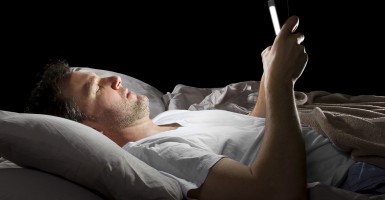Using smart phones, tablets, e-readers and other electronic devices before bedtime could be disrupting our sleep patterns, a new study finds.
If that doesn’t come as a surprise, here’s the kicker: Besides making us tired, such gadgets also could affect our long-term health.
The study, published Dec. 22 in the Proceedings of the National Academy of Sciences, warns that the light emitted by electronic devices may have a greater impact on our sleep—and possibly our health—than previously thought.
With a sample size of a dozen adults, researchers compared the effects of participants reading from an electronic book with reading from a printed book before bed. For five days straight, users first read from an iPad, then switched to a printed book for another five consecutive days.
Researchers found that using light-emitting devices before bed:
- Prolongs the time it takes to fall asleep.
- Delays the circadian clock, or built-in daily rhythm.
- Suppresses levels of the sleep-promoting hormone melatonin.
- Reduces the amount and delays the timing of REM sleep.
- Reduces alertness the following morning.
- Increases alertness, which may lead users to delay bedtime.
What’s alarming, the authors point out, is how many American adults use electronics before bed. Fully 90 percent of adults use some type of electronics at least a few nights per week within an hour of bedtime.
The unintended biological consequences are of “particular concern,” the authors say, “given recent evidence linking chronic suppression of melatonin secretion by nocturnal light exposure with the increased risk of breast, colorectal, and advanced prostate cancer.”
Sounds like some Americans might want to consider a New Year’s resolution to revert to printed books before bed — and give their iPads a rest.



























